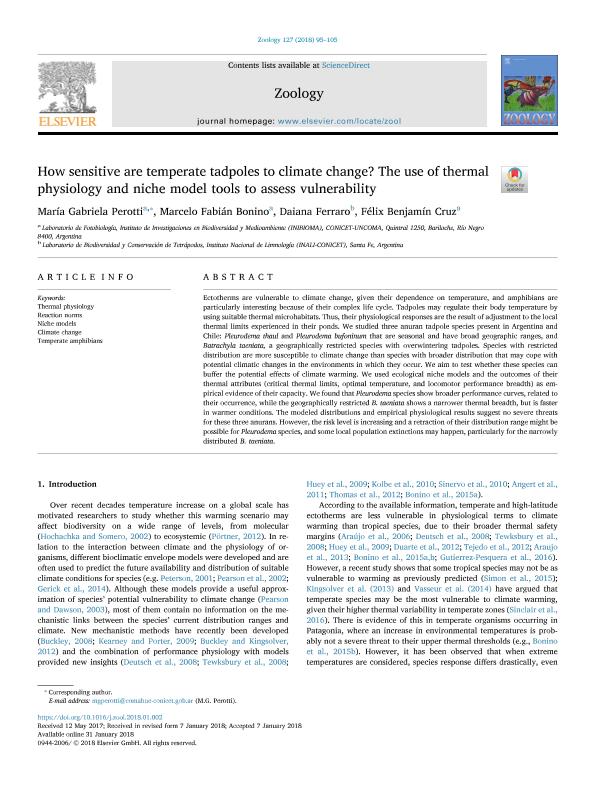Artículo
How sensitive are temperate tadpoles to climate change? The use of thermal physiology and niche model tools to assess vulnerability
Fecha de publicación:
04/2018
Editorial:
Elsevier Gmbh
Revista:
Zoology
ISSN:
0944-2006
Idioma:
Inglés
Tipo de recurso:
Artículo publicado
Clasificación temática:
Resumen
Ectotherms are vulnerable to climate change, given their dependence on temperature, and amphibians are particularly interesting because of their complex life cycle. Tadpoles may regulate their body temperature by using suitable thermal microhabitats. Thus, their physiological responses are the result of adjustment to the local thermal limits experienced in their ponds. We studied three anuran tadpole species present in Argentina and Chile: Pleurodema thaul and Pleurodema bufoninum that are seasonal and have broad geographic ranges, and Batrachyla taeniata, a geographically restricted species with overwintering tadpoles. Species with restricted distribution are more susceptible to climate change than species with broader distribution that may cope with potential climatic changes in the environments in which they occur. We aim to test whether these species can buffer the potential effects of climate warming. We used ecological niche models and the outcomes of their thermal attributes (critical thermal limits, optimal temperature, and locomotor performance breadth) as empirical evidence of their capacity. We found that Pleurodema species show broader performance curves, related to their occurrence, while the geographically restricted B. taeniata shows a narrower thermal breadth, but is faster in warmer conditions. The modeled distributions and empirical physiological results suggest no severe threats for these three anurans. However, the risk level is increasing and a retraction of their distribution range might be possible for Pleurodema species, and some local population extinctions may happen, particularly for the narrowly distributed B. taeniata.
Archivos asociados
Licencia
Identificadores
Colecciones
Articulos(INALI)
Articulos de INST.NAC.DE LIMNOLOGIA (I)
Articulos de INST.NAC.DE LIMNOLOGIA (I)
Articulos(INIBIOMA)
Articulos de INST. DE INVEST.EN BIODIVERSIDAD Y MEDIOAMBIENTE
Articulos de INST. DE INVEST.EN BIODIVERSIDAD Y MEDIOAMBIENTE
Articulos(MACNBR)
Articulos de MUSEO ARG.DE CS.NAT "BERNARDINO RIVADAVIA"
Articulos de MUSEO ARG.DE CS.NAT "BERNARDINO RIVADAVIA"
Citación
Perotti, Maria Gabriela; Bonino, Marcelo Fabián; Ferraro, Daiana Paola; Cruz, Felix Benjamin; How sensitive are temperate tadpoles to climate change? The use of thermal physiology and niche model tools to assess vulnerability; Elsevier Gmbh; Zoology; 127; 4-2018; 95-105
Compartir
Altmétricas




